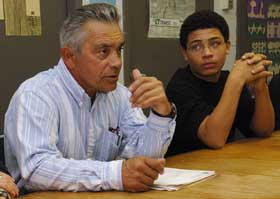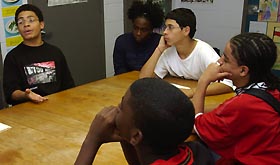|
This is an archived article.
For the latest news, go to the Advance
Homepage
For more archives, go to the Advance Archive/Search Page. |
||||
|
Making A Difference IN Kids' Lives
"Hey, Mister. Whatup?"
Borrero Reaches Out To Some Of Hartford's Most Troubled Youth By Elizabeth Omara-Otunnu Seven youngsters at Hartford's South Middle School filter into the room in ones and twos, greeting Professor Michael Borrero like an old friend. They fish for their permission slips in book bags and pockets. Some have remembered them, others have not. Borrero doesn't want excuses: "It's your responsibility," he says.
The group is one of three that Borrero, professor of social work and director of the Institute for Violence Reduction, runs at the school: two for boys, one for girls. The groups, which meet once a week, are part of an initiative to reduce violence among young people. Taking responsibility is at the heart of the program. One kid is in trouble for singing in the hallway. "It reflects badly on all of us," says Borrero. "The teachers will think this group is not serious." He tells the kid he needs to apologize to the teacher, and offers to accompany him. "It's no big deal, but it is a big deal because you broke the rules," he says. South Middle School, in the city's South End, has staff and facilities that any community would be proud of, but its 750-plus students in grades 6 through 8 cope daily with problems associated with poverty. Many come from homes that range from neglectful to abusive, say the school's counselors. Parents have a hard time making ends meet, and spend little time with their children; TV, movies and video games play a big part in the kids' lives. Like other schools, South Middle is under pressure to improve test scores. But Principal Jim Fagan recognizes that standardized testing represents only one aspect of education, and he welcomes what Borrero brings to the school: "The academic stuff isn't going to happen unless kids are well adjusted and feel good about themselves," he says. Borrero, who began working with gangs in New York City in the 1950s, has spent his career trying to help troubled youth. During his work with gangs in Hartford in the mid-1990s, he realized the need for intervention at an earlier stage, to help prevent young people from getting involved in violence. He launched the program at South Middle School in 1997. If troubled adolescents don't get help, "they may already have made such poor decisions that it's too late," notes sixth-grade counselor Deana Leikin. From the Heart
Participation in the program is voluntary. Borrero emphasizes that if they want to be part of it, the kids must behave appropriately and speak candidly. "It has to come from the heart," he tells them, "otherwise you're just faking it, and I don't want to be part of that. You've gotta be real." If they act responsibly, Borrero provides them with rewards, ranging from small amounts of money to coveted tickets to Husky basketball or football games. Last year, he also took them to make presentations to his social work class. The program's year-long curriculum comprises a series of 45-minute sessions examining themes such as violence, courage, love, respect, loyalty, and snitching. The groups also discuss coping strategies, decision-making, anger management, and goal setting. Borrero begins by asking the participants to reflect on the question, "Who am I?" and to share their thoughts with the group. The first to volunteer is eighth-grader Alfonso Dixon: "I am Alfonso Dixon," he begins. "I am a white and black boy. I'm someone who don't like to be messed with. I've been in over 24 fights in my life." Borrero picks up on the theme of race. "That's brought you some conflicts," he observes. "People bother me because of my race," responds Dixon. "Last year if they said something, I got ticked off and I started fighting. Now if somebody talk junk, I can ignore it. You guys taught me that." Borrero steers the conversation to the topic of parents. Most of the boys are confident of their mothers' love. They are far more ambivalent about their fathers, and he tries to help them deal with that. "My mother is my mother and my father. She take care of me by herself," says one. Another tells how he decided not to see his father any more, because he began selling drugs again after coming out of jail. "I don't want to get in trouble with the cops," the boy says. "That's a tough decision but a wise decision," comments Borrero. The atmosphere is somber now. Gone is the bravado of the session's first few minutes. No one is poking fun. Instead, each listens as others speak, waiting to contribute. Before the discussion shifts to arrangements for the next day's football game at UConn, Borrero throws out a safety net. "Sometimes heavy stuff happens in group," he says. "If you're uncomfortable about something and don't have time to talk here, see me or one of the counselors. Don't leave here with a heavy heart." Turning Lives Around
"I look for young people who want to make some changes in their lives and are streetwise," says Borrero, who trains them to work with the kids. "They've been through a lot, and because of their situations have learned how to help others." In addition to working at the school, Borrero's assistants are on call at any time. He provides them with cell phones, so the kids have someone to turn to in a crisis. Linda Bush, a seventh-grade counselor, says it's an effective strategy: "These people have paid a big price. They want to help the kids not make the same choices." One is Iran "Smurf" Nazario, a former member of the Los Solidos gang, with whom Borrero has worked for many years. Nazario will collaborate this year with Edna Comer, an assistant professor of social work, to get parents more involved. Keith Burrell, an 18-year-old who joined the staff this fall, will help facilitate the group sessions and serve as a mentor. He says his own experience helps him understand what the kids, just a few years younger than him, are going through: "If I knew then what I know now, it would have helped. I can tell them what corners to take and what not to take. I can say, 'I took that corner and found it was a dead end, so don't go left, go right'." The problems may sometimes seem intractable, but those involved in the program are convinced it's effective. "We see progress on an emotional level - in the way the kids communicate with each other," says eighth-grade counselor Mitch Grant. "They may be in trouble fewer times a week, or skip school less often. Progress is sometimes measurable, often unmeasurable, and it may not become evident for years." Some of the students already recognize the benefits. Seventh-grader Gabriel Alvarez, who participated last year, is proud that he no longer needs to be in the program. "I was doing real bad in school, getting Ds or Cs or Fs. I got suspended a lot," he says. "Now I'm doing better. I got four As and one B. Mr. Borrero said it's good to get an education, and I thought, 'Why should I do bad if I want an education?' So I started doing good. I haven't missed any homework this year." Trashawna Martin, now in eighth grade, values what she has learned from the program: "We talked about our life, things that happened, and ways that can help. I had a lot of experiences I thought I couldn't change, and I found I could. I'm making progress and I like that." Eighth-grader Stephanie Gonzalez says she gained a lot, too: "I was loud when I came here. I couldn't control my temper. You couldn't even look at me. This year I changed a whole lot, because they spoke to me in the group and made me understand." Principal Jim Fagan has no doubt about the program's positive contribution. "Mike does things we just can't do," he says. "Kids we normally can't touch, he can touch. He's made a difference in our school and a difference in kids' lives." |


